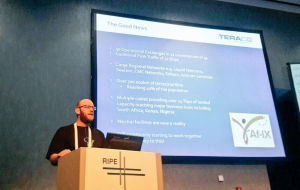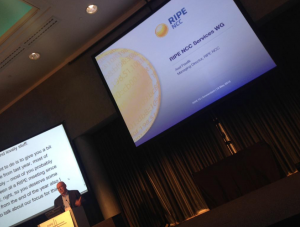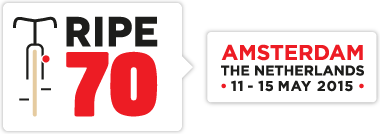Attendees checked in so far: 636
Wednesday was the first full day of RIPE Working Group sessions. Here are the day’s highlights:
Address Policy Working Group – Sessions I and II
- A discussion on Job Snijders’ proposal to remove the multi-homing requirement on ASN assignments; the focus was on ensuring there was an adequate “garbage collection” mechanism to return unused ASNs and to prevent future hoarding.
- A discussion on a proposal to put a 24-month holding period in place before /22 IPv4 allocations from the RIPE NCC could be transferred.
- Alexander Brinkmann’s presentation via Skype on a proposal to allow the RIPE NCC to evaluate larger IPv6 allocations for special cases.
- A discussion on IPv6 addressing approaches in very large organisations, which touched on the nature of Internet number resources and to what extent they are truly global vs being bound by geographical jurisdictions.
- In the (abridged) open policy hour, Erik Bais discussed his unified transfer policy that would apply to all Internet number resources and Elvis Velea and Radu-Adrian Feurdean gauged the community’s interest in a proposal to allow LIRs to request additional IPv4 space from the last /8.
DNS Working Group – Session I
- Anand Buddhev and Romeo Zwart from the RIPE NCC presented a status update and announced that the RIPE NCC is accepting new requests from organisations interested in hosting a K-root node, starting today.
- Jan Včelák presented on KNOT 2.0 and showed new features, like how to do DNSSEC with KASP.
- Olafur Guðmundsson explained why he likes ECDSA in DNSSEC and sees it as the way forward.
Connect Working Group:
-

Andrew Owens talks about peering innovation in Africa
Kurtis Lindqvist gave an overview of the IXP Topography Project, citing some interesting stats like the fact that 76% of IXPs are membership based, academic or not-for-profit.
- Florence Lavroff gave a progress report on the CDN best practices document.
- Bijal Sanghani shared some insight into how EURO-IX’s support program works.
- An interesting glimpse into the inner workings of ISOC’s IXP Toolkit and best practices document from Jane Coffin, including some interesting logistical challenges of getting equipment into some countries (customs charging 10k to get a switch into Egypt and Bolivia customs thinking Raspberry Pis were spy devices).
- Innovations in peering in Africa were presented by NAPAfrica’s Andrew Owens: 700 km of terrestrial fibre in Africa reaches over 40% of the population and although the cost of bandwidth is still costly, the price is rapidly dropping.
MAT Working Group:
- The latest RIPE Atlas features, including real-time data streaming, two new measurement types (NTP and TLS), probe tagging and more. Emile Aben got a round of applause for his “IXP-Jedi” tool, which lets users map traffic through IXPs, while Robert Kisteleki gave an impromptu demonstration of RIPE Atlas’ view of the Internet outage in Amsterdam from earlier in the day.
- BGP Stream, a software framework for the historical analysis and real-time monitoring of BGP data, garnered interest from many of the attendees. The project is a work-in-progress, with the first version expected this summer.
- A different approach to gathering data on end users by using Google ads, tagging by economy, ASN, IPv4 to IPv6 relationships and capability to produce useful graphs, tables and reports about Internet use around the globe.
Anti-Abuse Working Group:
- Brian Nisbet was re-elected as the Anti-Abuse Working Group Co-chair.
- A policy proposal to clean up historical “abuse-mailbox:” attributes was discussed and, because it impacts this working group directly, it will be closely followed.
- A presentation about mapping out cybercrime infrastructure.
RIPE NCC Services Working Group:

RIPE NCC Managing Director Axel Pawlik at the RIPE NCC Services Working Group
- RIPE NCC’s Managing Director Axel Pawlik gave an update on the organisation’s membership growth, an overview of its financial situation, IPv4 transfers, and the main focus points for 2015, including maintaining a strong registry, outreach activities, and improving services and efficiency.
- An update on the RIPE NCC’s external relations efforts at their offices in Amsterdam, Moscow and Dubai, as well as the current Internet governance landscape.
- An update on the RIPE NCC’s technical services, including RIPE Atlas, the global Internet measurement network; RIPEstat, the source of Internet address space information; DNS operations and plans to expand the K-root network for organisations interested in hosting their own node.
- The redesigned RIPE NCC website, which was based on feedback from members and the wider community, and focuses on providing a more intuitive navigational structure, better search functionality, and a more modern, clean look.












